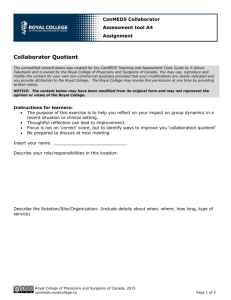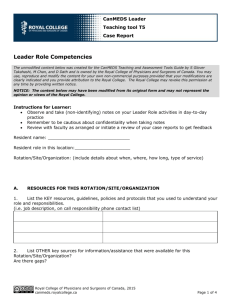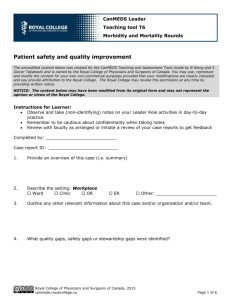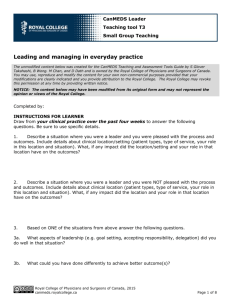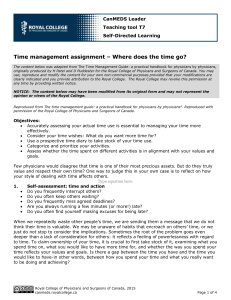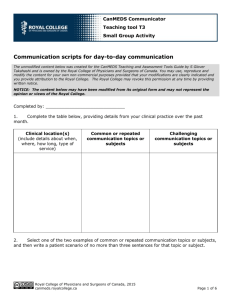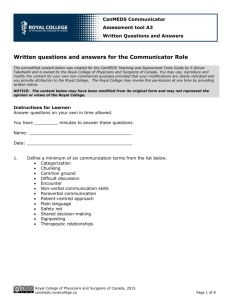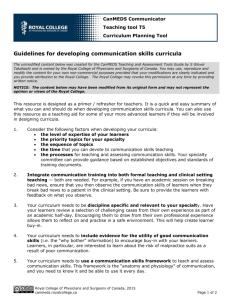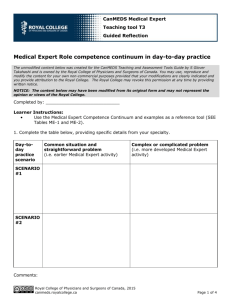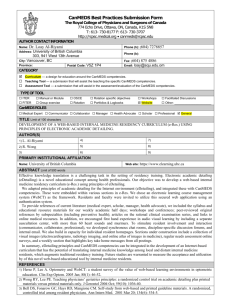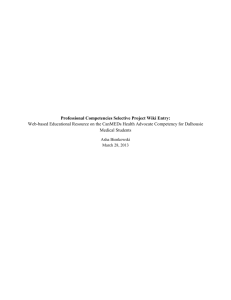MS Word - CanMEDS Interactive
advertisement
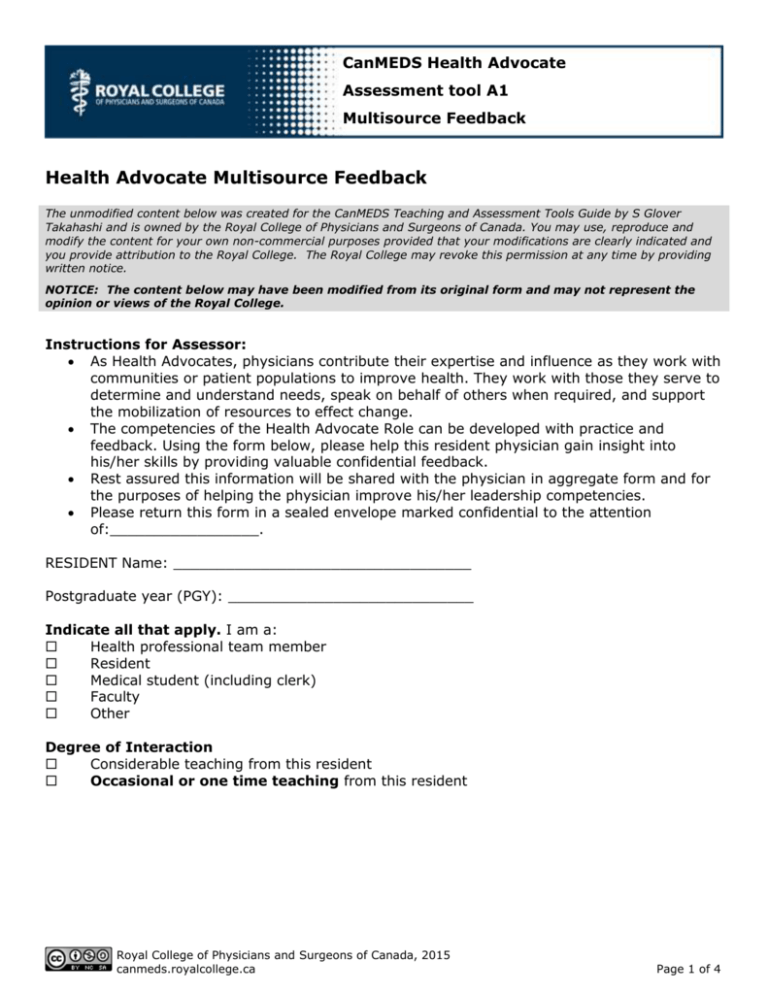
CanMEDS Health Advocate Assessment tool A1 Multisource Feedback Health Advocate Multisource Feedback The unmodified content below was created for the CanMEDS Teaching and Assessment Tools Guide by S Glover Takahashi and is owned by the Royal College of Physicians and Surgeons of Canada. You may use, reproduce and modify the content for your own non-commercial purposes provided that your modifications are clearly indicated and you provide attribution to the Royal College. The Royal College may revoke this permission at any time by providing written notice. NOTICE: The content below may have been modified from its original form and may not represent the opinion or views of the Royal College. Instructions for Assessor: As Health Advocates, physicians contribute their expertise and influence as they work with communities or patient populations to improve health. They work with those they serve to determine and understand needs, speak on behalf of others when required, and support the mobilization of resources to effect change. The competencies of the Health Advocate Role can be developed with practice and feedback. Using the form below, please help this resident physician gain insight into his/her skills by providing valuable confidential feedback. Rest assured this information will be shared with the physician in aggregate form and for the purposes of helping the physician improve his/her leadership competencies. Please return this form in a sealed envelope marked confidential to the attention of:_________________. RESIDENT Name: __________________________________ Postgraduate year (PGY): ____________________________ Indicate all that apply. I am a: Health professional team member Resident Medical student (including clerk) Faculty Other Degree of Interaction Considerable teaching from this resident Occasional or one time teaching from this resident Royal College of Physicians and Surgeons of Canada, 2015 canmeds.royalcollege.ca Page 1 of 4 CanMEDS Teaching and Assessment Tools Guide The resident... Health Advocate assessment tool A1 1 2 3 4 5 Very poor Needs improvement Competent Skilful Exemplary Not able to comment A. Identifies health needs in a timely and appropriate manner (including advocacy for health services or resources, advocacy for healthy behaviours, and advocacy for prevention, promotion, or surveillance) B. Focuses on patient’s health care needs, preferences, and values C. Collaborates with other health care professionals and/or health promotion organizations D. Works with patient (and their family) E. Balances health advocacy with stewardship of health care resources Comments: Royal College of Physicians and Surgeons of Canada, 2015 canmeds.royalcollege.ca Page 2 of 4 CanMEDS Teaching and Assessment Tools Guide RESIDENT’S OVERALL PERFORMANCE a Health Advocate assessment tool A1 1 2 3 4 5 NEEDS SIGNIFICANT IMPROVEMENT BELOW EXPECTATIONS SOLID, COMPETENT PERFORMANCE EXCEEDS EXPECTATIONS SUPERB Areas of strength Areas for improvement 1. 1. 2. 2. 3. 3. Comments: Royal College of Physicians and Surgeons of Canada, 2015 canmeds.royalcollege.ca Page 3 of 4 CanMEDS Teaching and Assessment Tools Guide Health Advocate assessment tool A1 ASSESSOR SCORING NOTES A. Identifies health advocacy needs in a timely and appropriate manner 1. Does not recognize the need for advocacy or the impact of barriers on current/future health status of the patient. 3. Addresses or responds to requests for intervention or action to manage barriers in a timely and appropriate manner. Will respond to patient’s preferences and values when prompted. 5. Anticipates needs for advocacy through active dialogue with patient and team. Efficiently and sensitively identifies patient’s needs, preferences, and values. B. Focuses on patient’s health needs, preferences, and values 1. Focuses on physician and or system needs and priorities. Alternatively, lets patient drive agenda regardless of appropriateness of expressed wants and preferences. 3. Attends to patient. Provides workman-like responses to patient’s questions. Demonstrates care and attention to patient’s needs, preferences, and values. 5. Skilfully anticipates patient’s needs and questions. Responds with efficiency to patient’s needs, preferences, and values. Negotiates, manages, and clarifies differences. C. Collaborates with other health care professionals and/or health promotion organizations 1. Borders on rude or authoritarian or is overly deferential in approach. 3. Polite. Conveys information. Recognizes need for assistance. Communicates thoroughly, clearly, and in a timely fashion. Responsive to others’ requests and feedback. 5. Synthesizes and prioritizes information. Provides comprehensive verbal and written communication. Leads, follows, coordinates, and delegates appropriately and respectfully. Negotiates and manages conflicts and differences. D. Works with patient (and their family) 1. Does not inform patient/family of plans. Does not elicit patient/family wishes. Provides misinformation. 3. Elicits patient/family perspectives. Is respectful, establishes rapport, conveys patient/family concerns to team. 5. Consistently able to effectively communicate with patients/families. Skilled at sharing decision-making. Provides clear patient information. Confidently negotiates differences. E. Balances health advocacy with stewardship of health care resources 1. Only focuses on one role or the other, losing perspective and not achieving best solution(s). Does not work with others to find solutions that balance competing issues. 3. Recognizes the need for balance. Seeks advice and assistance. With effort of self and others, implements solutions that balance competing issues. 5. Consistently able to efficiently and collaboratively balance competing issues, perspectives, and priorities so that parties come to consensus and/or accept solutions. Royal College of Physicians and Surgeons of Canada, 2015 canmeds.royalcollege.ca Page 4 of 4
